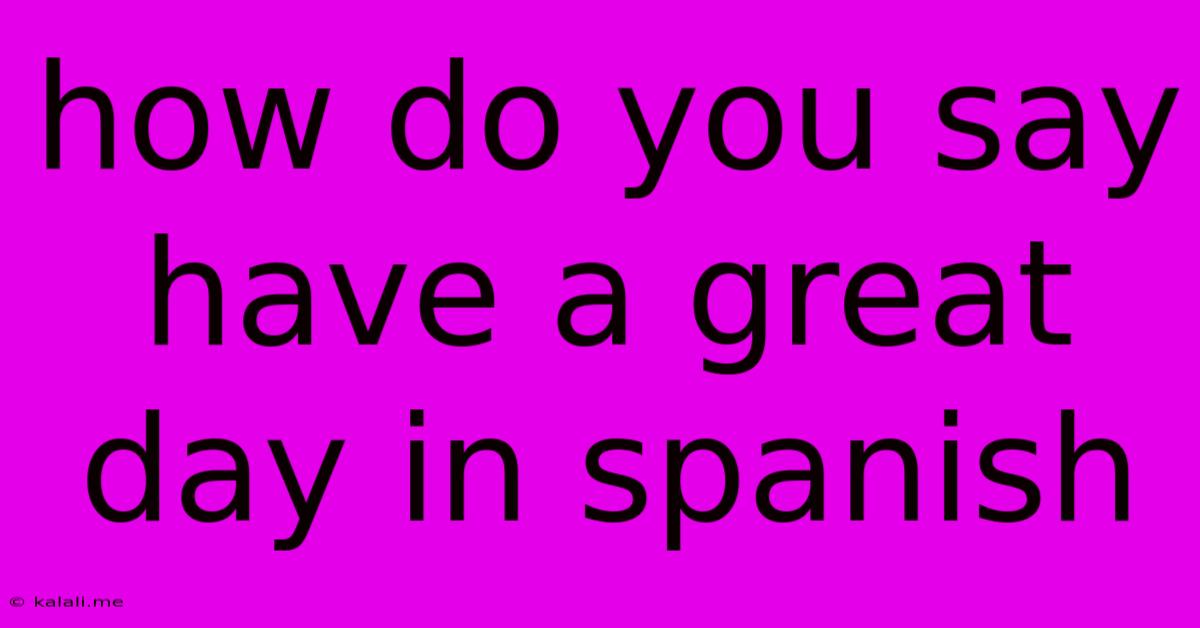How Do You Say Have A Great Day In Spanish
Kalali
May 24, 2025 · 2 min read

Table of Contents
How Do You Say "Have a Great Day" in Spanish? A Comprehensive Guide
Want to wish someone a wonderful day in Spanish? Knowing how to say "Have a great day" is a fantastic way to show politeness and friendliness. This guide explores various ways to express this sentiment, depending on the context and level of formality. We'll cover common phrases, regional variations, and even some more nuanced expressions to truly impress your Spanish-speaking friends.
The Most Common Ways to Say "Have a Great Day" in Spanish
The most straightforward translation of "Have a great day" is "Que tengas un buen día." This is a perfectly acceptable and widely understood phrase, suitable for most situations. It's polite, versatile, and easily remembered.
-
Que tengas un buen día: This literally translates to "That you have a good day." The use of "que tengas" (that you have) is a subjunctive mood, making it more polite and appropriate than simply stating "You have a good day."
-
¡Que tengas un gran día!: This is a slightly more emphatic version, using "gran" (great) instead of "buen" (good). It conveys a bit more enthusiasm and is suitable for closer friends or family.
-
¡Buen día!: This is a shorter, more informal greeting, akin to "Good day!" in English. It's perfectly acceptable in many contexts, but might be considered less personal than the longer phrases.
More Formal and Informal Options:
Depending on your relationship with the person and the time of day, you can adjust your phrasing:
-
Formal: For more formal settings, consider using "Que tenga un excelente día" (May you have an excellent day) or "Que pase un buen día" (May you spend a good day). These are more respectful and suitable for professional interactions.
-
Informal: Among close friends, you can opt for something more casual like "¡Pásala bien!" (Have a good time!) or "¡Que te vaya bien!" (Have a good one!). These phrases are more common amongst younger people and convey a more relaxed vibe.
Regional Variations:
Spanish is spoken across a vast geographical area, and some regional variations exist. While the phrases above are understood almost universally, you might encounter slight differences in pronunciation or word choice depending on the country or region. These variations are typically minor and don't affect the overall meaning.
Beyond the Basics: Adding Nuance and Personalization
To make your well-wishes even more personal, consider adding a detail specific to the situation:
- For someone going to work: "Que tengas un buen día en el trabajo!" (Have a good day at work!)
- For someone going on a trip: "¡Que tengas un gran viaje!" (Have a great trip!)
- In the evening: "Que tengas una buena noche!" (Have a good night!)
Mastering these phrases will enrich your Spanish communication, making your interactions more genuine and memorable. So go ahead and start using them! ¡Que tengas un buen día!
Latest Posts
Latest Posts
-
How To Remove Tracking Code From Saasland Theme
May 24, 2025
-
What Can Iron Golems Not Spawn On Java
May 24, 2025
-
Lftp Sync Remote To Local In Linux
May 24, 2025
-
How To Unfreeze Frozen Water Pipes
May 24, 2025
-
Water Comes Out Of Shower Head And Faucet
May 24, 2025
Related Post
Thank you for visiting our website which covers about How Do You Say Have A Great Day In Spanish . We hope the information provided has been useful to you. Feel free to contact us if you have any questions or need further assistance. See you next time and don't miss to bookmark.